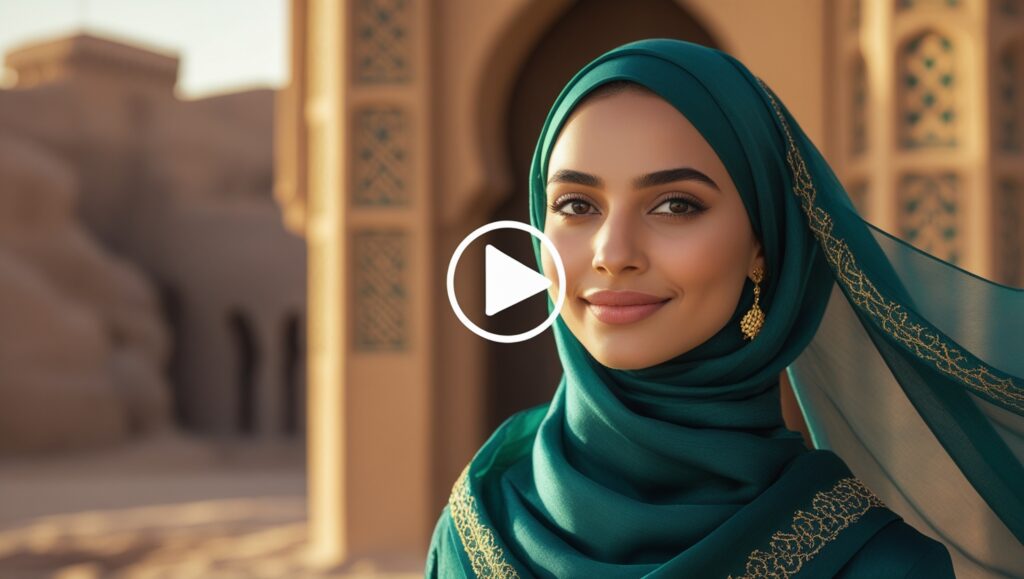In an era where global connectivity often highlights division, the story of Amira Al-Mansoori, a 24-year-old Arabian social media sensation, entrepreneur, and humanitarian, has emerged as a refreshing narrative of unity, cultural pride, and modern empowerment. With millions of followers spanning continents, Amira has become a household name, celebrated not only for her striking presence but for her mission to bridge cultures and redefine perceptions of Arab women in the 21st century.

Download the Video
From Local Roots to Global Stardom
Born and raised in Dubai, Amira grew up immersed in the rich traditions of her Emirati heritage. Her early life was shaped by the values of family, education, and community—a foundation that would later define her public persona. While studying international relations at the American University of Sharjah, she began sharing snippets of her life on Instagram: from traditional Emirati recipes to vibrant glimpses of Eid celebrations, and even candid discussions about balancing modern ambitions with cultural expectations.
Her authenticity resonated. A 2019 post showcasing her grandmother’s hand-embroidered kandura (a traditional Emirati dress) went viral, amassing over 2 million likes. Overnight, Amira became a symbol of cultural preservation for younger generations. “I never set out to be an influencer,” she said in a recent interview. “I just wanted to share what I love about my heritage—the colors, the stories, the warmth.”
Breaking Stereotypes with Grace
Amira’s rise coincided with a global shift in perceptions of Arab women. For decades, Western media often reduced them to outdated tropes—passive, voiceless, or oppressed. Amira, however, defies these stereotypes effortlessly. Her content blends tradition with modernity: she pairs intricately designed hijabs with contemporary fashion, discusses women’s rights in the Arab world, and collaborates with global brands like UNESCO to promote education for girls in rural communities.
In 2022, her TEDx talk, “The Hijab: A Crown, Not a Constraint,” went viral, sparking conversations about autonomy and identity. “The hijab isn’t about hiding,” she asserted. “It’s about choosing how you present your values to the world.” The speech, viewed over 15 million times, cemented her role as a voice for Muslim women navigating dual identities.
A Catalyst for Cross-Cultural Dialogue
What sets Amira apart is her ability to connect with audiences far beyond the Middle East. Fluent in Arabic, English, and French, she collaborates with creators from India, Nigeria, France, and beyond, celebrating shared values like family, resilience, and creativity. Her YouTube series, Coffee with Amira, features candid chats with global icons—from Bollywood actress Priyanka Chopra to Nigerian author Chimamanda Ngozi Adichie—exploring themes like cultural pride and breaking barriers.
Her impact is tangible. After partnering with a South Korean skincare brand, sales of halal-certified beauty products surged in Asia. A collaboration with a French fashion house led to a hijab-inspired collection that sold out in hours. “Amira isn’t just a trend,” says cultural analyst Leila Hassan. “She’s proof that embracing one’s roots can be a universal language.”
Philanthropy: Heart of Her Mission
Beyond the glitz of social media, Amira’s work as a humanitarian has earned her global admiration. In 2021, she founded Noor Al-Amal (“Light of Hope”), a nonprofit providing scholarships to girls in conflict zones like Yemen and Syria. The initiative, funded partly by proceeds from her merchandise line, has already supported over 500 students.
She also advocates for mental health, a taboo topic in many Arab communities. Her candid posts about her struggles with anxiety during the pandemic inspired thousands to seek help. “We need to normalize healing,” she shared in a heartfelt Instagram Live session. “Strength isn’t about silence—it’s about speaking up.”
The Controversies and Challenges
Amira’s journey hasn’t been without friction. Critics accuse her of “watering down” Arab culture to appeal to Western audiences, while some conservatives condemn her modern interpretations of tradition. In 2023, a debate erupted when she attended a Paris fashion week event without a hijab, sparking accusations of hypocrisy. Amira addressed the backlash head-on: “My faith isn’t defined by a piece of cloth. I wear the hijab as a choice, and choices can evolve.”
Despite the noise, her supporters—dubbed the Amirah Tribe—remain fiercely loyal. “She taught me to love my Arab identity unapologetically,” says Farah, a 19-year-old follower from Morocco.
Legacy in the Making
Today, Amira’s influence extends beyond screens. She’s been featured on Forbes’ 30 Under 30 list and invited to speak at the United Nations Youth Assembly. Yet, her focus remains rooted in grassroots change. Upcoming projects include a documentary on Arab female entrepreneurs and a children’s book series celebrating Arab folklore.
In a fractured world, Amira Al-Mansoori stands as a testament to the power of authenticity. She reminds us that cultural pride and global citizenship aren’t mutually exclusive—and that one young woman’s voice can inspire millions to embrace their own stories. As she often says: “Our differences don’t divide us. They make the world more beautiful.”